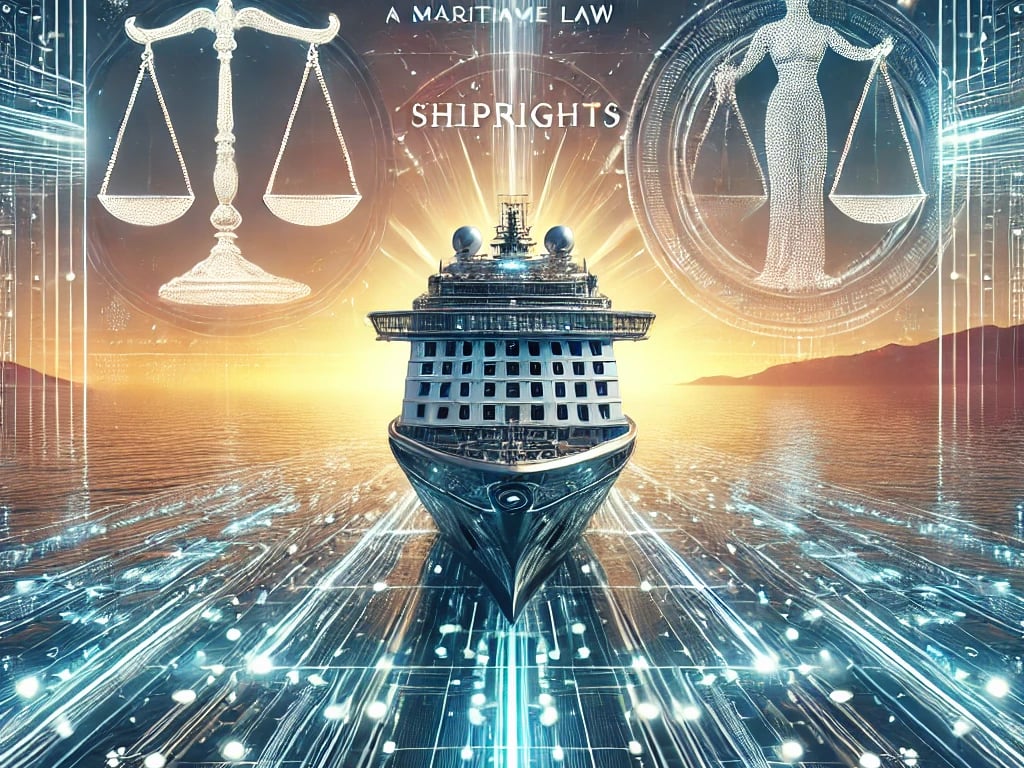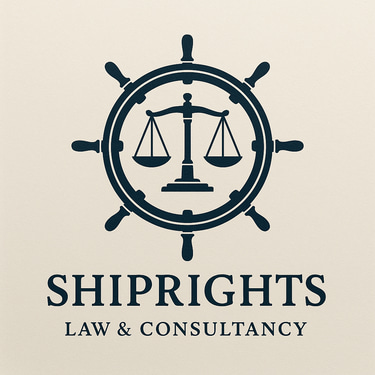Legal Liability in Ship Accidents: An Evaluation from the Perspectives of Shipowner, Master, and Insurer
8/5/20255 min read


Legal Liability in Ship Accidents : An Evaluation from the Perspectives of Shipowner, Master, and Insurer
By Shiprights Law & Consultancy – Experts in Maritime Law, Istanbul
Introduction
Ship accidents represent a significant legal and operational risk in global maritime commerce. From collisions and groundings to fires, explosions, oil spills, and cargo losses, maritime incidents can result in severe financial damage, reputational harm, environmental disasters, and even loss of life. Legal implications stemming from such accidents are often complex, spanning civil, criminal, administrative, and international law dimensions.
This article explores the legal responsibilities and consequences for three primary stakeholders in a ship accident: the shipowner (armatör), the vessel master (captain), and the marine insurer. Using Turkish law, international conventions, and practical legal procedures, we provide a detailed, structured legal roadmap for understanding and navigating liability in maritime incidents.
1. Legal Framework Governing Ship Accidents
The regulation of maritime accidents arises from a composite framework involving national legislation and binding international agreements.
A. Turkish Legal Framework:
Turkish Commercial Code (TCC) No. 6102: Book Five is the core legal text governing maritime commerce in Turkey, detailing obligations of shipowners, captains, and charterers.
Turkish Code of Obligations: Applicable in contractual and tort liability scenarios.
Administrative Regulations: Issued by the Ministry of Transport and Infrastructure, covering safety, licensing, and maritime investigations.
B. International Conventions and Standards:
COLREGs (International Regulations for Preventing Collisions at Sea): Prescribes rules of navigation to avoid collisions.
SOLAS (International Convention for the Safety of Life at Sea): Mandates safety equipment and operational protocols.
MARPOL (International Convention for the Prevention of Pollution from Ships): Regulates pollution control from vessels.
CLC 1992 (International Convention on Civil Liability for Oil Pollution Damage): Establishes liability for oil pollution damages.
LLMC 1976/1996 Protocol: Provides shipowners a right to limit liability in specified claims.
These legal instruments create a harmonized yet intricate network of obligations and liabilities that must be carefully managed in the aftermath of an accident.
2. Shipowner's Liability (Armatörün Hukuki Sorumluluğu)
The shipowner is the primary party held accountable for the vessel’s condition, the actions of its crew, and the consequences of its operation. Their liability is both direct and vicarious, with legal exposure increasing in proportion to negligence, procedural non-compliance, or regulatory violations.
A. Core Legal Responsibilities:
Ensuring Seaworthiness: The ship must be structurally sound, properly crewed, and adequately maintained.
Employing Qualified Crew: The master and officers must possess valid certifications, training, and medical fitness.
Implementing Safety Management Systems (ISM Code): Establishing protocols to ensure operational safety and prevent marine accidents.
Maintaining Logs and Records: Required for defense in legal proceedings.
B. Liability Scenarios:
Vicarious Liability: The shipowner is liable for negligent acts of the crew and master performed during duty.
Environmental Liability: Under CLC 1992 and Turkish Environment Law, shipowners face strict liability for pollution damage, regardless of fault.
Contractual Liability: Arising from charter party breaches or bills of lading violations.
C. Limitation of Liability:
As per LLMC 1976 and Turkish law, shipowners can establish a limitation fund to cap financial exposure unless gross negligence or willful misconduct is established.
Limitation is calculated based on vessel tonnage and nature of claims (e.g., personal injury, cargo loss).
D. Common Legal Risks:
Inadequate crew training
Expired certifications
Failure to follow emergency protocols
Poor maintenance records
Failing to comply with international and domestic safety standards exposes the shipowner to administrative penalties, criminal charges, and unlimited civil liability.
3. Master's (Captain's) Liability
The captain acts as the legal representative of the ship while at sea. Though subordinate to the shipowner in legal hierarchy, the master carries significant personal responsibility in both operational and legal contexts.
A. Key Duties of the Master:
Navigation and Watchkeeping: Complying with COLREGs and ensuring constant vigilance.
Emergency Response: Leading evacuations, firefighting, and pollution containment.
Crew Discipline and Welfare: Enforcing safety rules and managing fatigue risks.
Communication: Reporting accidents to authorities and flag state administrations.
B. Legal Exposure:
Civil Liability: For damages resulting from gross negligence, such as ignoring navigational warnings.
Criminal Liability: Can be prosecuted under Turkish Penal Code for deaths, injuries, or environmental violations (e.g., unlawful discharge of oil).
Administrative Sanctions: Flag state or port state may suspend licenses, detain the vessel, or impose fines.
The master’s logbooks, reports, and decision-making during the incident are often central in court and insurance investigations.
4. Insurer’s Role and Legal Responsibility
Insurance companies play a crucial role in distributing maritime risks and offering financial relief after an accident. Legal complications often arise regarding scope of coverage, exclusions, and policyholder duties.
A. Types of Maritime Insurance:
Hull and Machinery (H&M): Physical damage to vessel.
Protection & Indemnity (P&I): Third-party liabilities like pollution, injury, and cargo claims.
Freight, Demurrage, and Defense (FD&D): Legal costs in contractual disputes.
Cargo Insurance: Loss or damage to goods.
B. Legal Duties of the Insured:
Utmost Good Faith: Full disclosure of relevant risks.
Timely Notification: Immediate reporting of incidents.
Compliance with Warranties: Navigational limits, port restrictions, and crew qualifications.
C. Grounds for Claim Rejection:
Non-disclosure or misrepresentation
Intentional misconduct
Breach of warranties
D. Resolution Mechanisms:
Most marine insurance policies mandate arbitration (usually in London or Paris) governed by English or international maritime law.
5. Legal Procedures Following a Ship Accident
When a ship accident occurs, multiple legal processes are initiated, often simultaneously.
A. Administrative Investigation:
Conducted by Turkish Harbour Master and the Ministry of Transport.
Can lead to vessel detention, license suspension, or IMO notification.
B. Civil Litigation:
Filed for personal injury, property loss, or environmental harm.
Jurisdiction determined by flag state, place of incident, or contract.
C. Criminal Proceedings:
Opened in cases involving fatalities, gross negligence, or pollution.
May result in imprisonment, fines, and professional bans.
D. Constitution of Limitation Fund:
Shipowners can file to establish a liability limitation fund before a maritime court.
Prevents asset seizure beyond capped amounts.
E. Arbitration & Mediation:
Faster, confidential, and cost-effective dispute resolution mechanisms.
Widely used in charter party and insurance disputes.
6. Proactive Legal Risk Management
To reduce post-incident legal exposure, maritime stakeholders must implement proactive strategies:
Legal Compliance Audits: Regular reviews of vessel documentation and crew compliance.
Safety Training Programs: Ongoing education on SOLAS, MARPOL, and national laws.
Clear Contractual Clauses: Well-drafted charter parties and insurance policies.
Crisis Management Plans: Legal protocols for reporting, containment, and communication.
Expert Legal Counsel: Early involvement of maritime lawyers following incidents.
Preventing legal problems through structured compliance and timely intervention can reduce costs, preserve reputation, and ensure business continuity.
Conclusion: Let Shiprights Navigate Your Legal Course
At Shiprights Law & Consultancy, we know that a ship accident is more than just a maritime event—it's a legal emergency requiring fast, strategic, and informed action. Our Istanbul-based law firm is dedicated exclusively to maritime and transport law, providing:
⚓ Courtroom Advocacy – Skilled representation in Turkish maritime courts and international tribunals
⚓ 24/7 Legal Support – Emergency legal consultation for shipowners, insurers, and crew following maritime incidents
⚓ Complete Legal Coverage – Accident investigation, insurance claims, limitation fund proceedings, and regulatory defense
With a deep understanding of both international conventions and Turkish legal procedures, Shiprights is equipped to guide you through every wave of legal complexity.
🚢 Whether you're dealing with a catastrophic collision, environmental spill, crew injury, or insurance dispute—Shiprights is your trusted legal anchor in turbulent waters.
📩 Contact us today to schedule a confidential consultation and secure your legal position before, during, and after any ship accident.
🔹 Shiprights Law & Consultancy
🌐 www.shiprights.com
📍 Istanbul, Turkey
